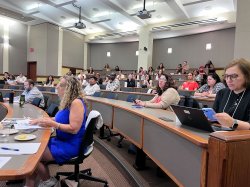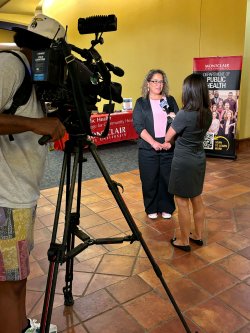What Can be Done about the Maternal Health Care Crisis?
Posted in: Public Health

Montclair State University has been at the forefront of illuminating maternal and child healthcare for years and preparing a healthcare workforce with the knowledge to help address the growing problem of maternal mortality and morbidity, an increasing concern across the United States, which far exceeds the number of maternal mortality rates of all other industrialized nations. The University also is working to develop the current maternal healthcare workforce.
Maternal health statistics
- With the fourth-highest maternal mortality rate in the country, New Jersey has placed a growing emphasis on maternal health.
- The numbers are higher for Black women who are three times more likely than white women to die from pregnancy-related complications.
- Up to 60 percent of these deaths are preventable, according to national data, says Montclair’s Assistant Director for Maternal-Infant Health Policy Jill Wodnick.
What Montclair experts say about maternal health
“The state of maternal health is in desperate need of transformation,” says Wodnick, a perinatal educator and doula mentor at Montclair and former member of the United Nations Commission on the Status of Women’s Global Prenatal Initiative.
Whether looking at maternal morbidity and mortality rates or how many infants survive until their first birthday, “all of those indicators that are used by the CDC [Center for Disease Control] that are used by federal and state governments, the indicators for consumers show that maternity care is inequitable, unjust and unsafe.”
“Maternal health requires bigger structural changes that allow early, consistent access to prenatal care.”
–Stephanie Silvera, Professor, Department of Public Health
As a member of various federal and state task forces, Wodnick says she is fortunate to work on systems to improve maternity care in New Jersey. “Montclair brings to the table a diverse, inclusive, incredibly interdisciplinary approach to complex issues that we can’t be reductionist about, that we have to be thoughtful, intentional and collaborative about.”
Taking action on maternal and child health issues
To that end, Montclair’s Department of Public Health, part of the College for Community Health, has created the PHAST-Track Institute to focus on “building and supporting public health workforce capacity and capability.” PHAST stands for Public Health Advancement, Scholarship and Training.

The brainchild of Public Health Professor Stephanie Silvera, the Institute held its first conference this summer, convening state and community partners to discuss maternal and child health.
Such collaboration between institutions, community organizations, and professionals to address maternal and child health issues are necessary, says Silvera, adding that a more diverse healthcare workforce can better serve underserved communities, which is key to addressing health disparities. While the state now requires implicit bias training for all maternal healthcare workers, she says there’s more work to be done.
Among the topics covered during the Institute’s conference were bias training for health care workers, developed by the State’s Department of Health, and the role of fathers in maternal and child health outcomes.
Another benefit of working with community partners, Silvera says, is creating research, internship and employment opportunities for Montclair undergraduate and graduate students.
Workforce development for professionals will continue to be the focus of the PHAST-Track Institute, which will address an array of other critical public health topics, according to Professor and Chair of the Department of Public Health Lisa Lieberman.
As part of the PHAST-Track Institute, Montclair will offer asynchronous courses to those in the healthcare workforce. Silvera says she’s excited about making the courses accessible to people who have not had an opportunity to obtain a college degree.
I’m a ______, tell me more…
Prospective Student / Parent: Learn more about Public Health and other health programs, plan a visit to our campus and take the first step in applying to become a Red Hawk!
Media: Contact the Media Relations team for assets or to schedule an interview with our public health experts about this topic. See more Faculty Experts and hi-res media assets available for download.
